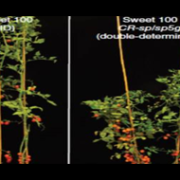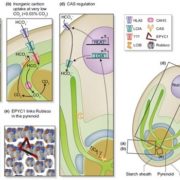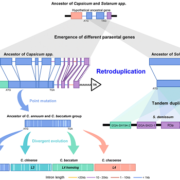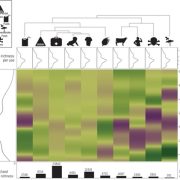Genome-scale sequence disruption following biolistic transformation in rice and maize (bioRxiv)
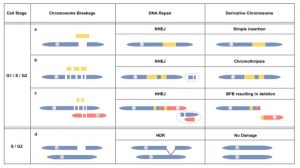 The two classic approaches to introducing DNA into a plant’s genome are by harnessing Agrobacterium tumefaciens’ fascinating gene-transfer skill, or by shooting the new DNA into the cell using a “biolistic” (gun) approach. Because of Agrobacterium’s restricted choice of hosts, the biolistic method has been preferred for monocots. Traditionally, regenerants are characterized phenotypically and by DNA hybridization, so the broader genomic effects of the biolistic bombardment aren’t well known. To find out, Liu et al. bombarded linear (phage lambda) and circular DNA into rice and wheat, and then analyzed the resulting lines using whole-genome sequencing. They found “multiple forms of genome damage …. including chromosome breakage and shattering and extreme copy number variation.” The authors speculate that the outcome may depend on the stage of the cell cycle when the event occurred. The authors also observe that “there is no evidence that a genomic rearrangement has compromised the safety of a plant used as food” and “there is a rigorous selection process that eliminates deleterious mutations during the breeding process.” (Summary by Mary Williams) bioRxiv 10.1101/379644
The two classic approaches to introducing DNA into a plant’s genome are by harnessing Agrobacterium tumefaciens’ fascinating gene-transfer skill, or by shooting the new DNA into the cell using a “biolistic” (gun) approach. Because of Agrobacterium’s restricted choice of hosts, the biolistic method has been preferred for monocots. Traditionally, regenerants are characterized phenotypically and by DNA hybridization, so the broader genomic effects of the biolistic bombardment aren’t well known. To find out, Liu et al. bombarded linear (phage lambda) and circular DNA into rice and wheat, and then analyzed the resulting lines using whole-genome sequencing. They found “multiple forms of genome damage …. including chromosome breakage and shattering and extreme copy number variation.” The authors speculate that the outcome may depend on the stage of the cell cycle when the event occurred. The authors also observe that “there is no evidence that a genomic rearrangement has compromised the safety of a plant used as food” and “there is a rigorous selection process that eliminates deleterious mutations during the breeding process.” (Summary by Mary Williams) bioRxiv 10.1101/379644


